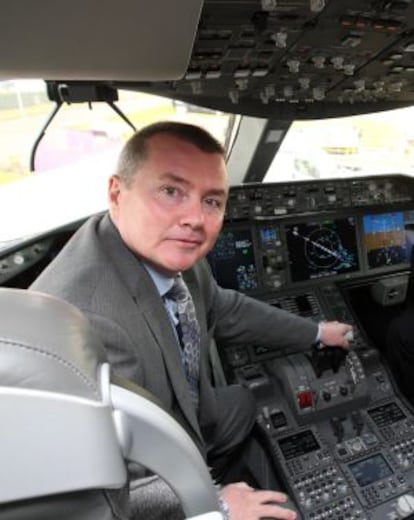“Some in the unions would rather watch Iberia die than restructure”
Willie Walsh, the CEO of International Airlines Group, says he has the best interests of Spain’s leading carrier at heart

Willie Walsh, the Irish CEO of International Airlines Group (IAG) - the holding company that controls Iberia and British Airways (BA) since their merger in 2011 -- has become the bête noire of the Spanish carrier's unions, who consider him chiefly to blame for the serious crisis their company is going through.
More specifically, Iberia worker representatives accuse Walsh, 51, of running the group with BA's benefit in mind (he is also CEO of the British firm). They fear that the high-profile airline executive is preparing to dismantle Iberia after announcing a restructuring plan that includes 4,500 layoffs (23 percent of the workforce) and a 15-percent route reduction in 2013.
Walsh's reputation precedes him. He was a pilot and a union representative himself before becoming an airline executive, and he earned the nickname of "The Slasher" for his aggressive cost-cutting while at the helm of Aer Lingus.
IAG is forecasting operating losses of 120 million euros in 2012, mostly due to Iberia's poor performance. In an interview with two Spanish dailies earlier this month in South Korea, on the occasion of the inauguration of a new London-Seoul route, Walsh defended the need to restructure Iberia.
Asked about his opinion regarding the Iberia pilots' proposals to dismantle the 2011 merger, he said that this is not an option.
"Going back on the merger would be crazy," he said. "The operation has created important synergies."
Not one penny, not one cent, has been transferred from Iberia to British"
According to him, critics of the 2011 merger simply want to conceal the fact that Iberia urgently needs to be restructured.
If Iberia had not merged with BA it would now be a much weaker airline with regard to its rivals, Walsh argued. In his mind, the thing that really hurt Iberia was the unions' refusal to recognize the need for change. "Those who are trying to stop the adjustment are trying to destroy Iberia. They would rather watch Iberia die than restructure."
There is a perception among the Spanish public that the merger was a de facto acquisition by BA of the country's flagship carrier. But Walsh, who notes that he himself is Irish and is influenced solely by business interests rather than issues of nationality, says that playing the patriotism card is "an attempt by Iberia to conceal its problems."
The company, he said, has been losing money since 2008. "The unions suggest that Iberia's money has ended up at British Airways. I challenge anyone to prove that. Not one penny, not one cent, has been transferred from Iberia to British."
Iberia unions point out that between 1996 and 2008, before the merger, Iberia was making money and now it is losing 1.7 million euros a day. But Walsh says that this is being selective with the data.
"The question is, how much money did BA make between 1996 and 2008? At least twice as much as Iberia made. BA restructured its business following the financial crisis of 2008, and it did so significantly, by reducing the workforce and introducing new contracts with more efficient wage levels. Iberia did not. That is why British is now profitable while Iberia is losing a lot of money."
What's more, Iberia's pilot union claims that Iberia's earnings have been used to pay BA's retirement plans. But Walsh again asserts that this is a lie and that "not one penny, not one cent from Iberia has gone into BA."
According to Walsh, both companies are destined to grow at a different pace because the economic conditions in Britain and Spain are very different. Also, Iberia is facing growing competition from low-cost airlines while the excess capacity at Barajas airport in Madrid is allowing other companies to grow.
Iberia has announced that it will stop flying to Havana, Santo Domingo, Athens, Istanbul and other major cities. Walsh denies that BA has its own interest in these markets, or that the British airline plans to increase its presence in Madrid.
"We are not interested, and the tax hike makes the market less attractive," he said. "Our strong brand in Madrid is Iberia. It's not true that BA wants to grow in Madrid."
The Spanish government has warned that Iberia is a strategic asset for Spain's tourism sector, but the airline executive seemed unconcerned about possible measures to protect the carrier.
"There are laws in Europe against state aid," he noted. "Besides, the Spanish government is also dealing with an economic crisis. I agree that Spain's dependence on tourism is very high, but it is crazy for a country so dependent on tourism to raise airport taxes at a time of crisis."
Regarding his vision of Iberia for the future, he said that Madrid is the natural gateway to many Latin American destinations, and that when economic conditions improve, "a more competitive Iberia will grow mainly toward that region."
Tu suscripción se está usando en otro dispositivo
¿Quieres añadir otro usuario a tu suscripción?
Si continúas leyendo en este dispositivo, no se podrá leer en el otro.
FlechaTu suscripción se está usando en otro dispositivo y solo puedes acceder a EL PAÍS desde un dispositivo a la vez.
Si quieres compartir tu cuenta, cambia tu suscripción a la modalidad Premium, así podrás añadir otro usuario. Cada uno accederá con su propia cuenta de email, lo que os permitirá personalizar vuestra experiencia en EL PAÍS.
¿Tienes una suscripción de empresa? Accede aquí para contratar más cuentas.
En el caso de no saber quién está usando tu cuenta, te recomendamos cambiar tu contraseña aquí.
Si decides continuar compartiendo tu cuenta, este mensaje se mostrará en tu dispositivo y en el de la otra persona que está usando tu cuenta de forma indefinida, afectando a tu experiencia de lectura. Puedes consultar aquí los términos y condiciones de la suscripción digital.









































